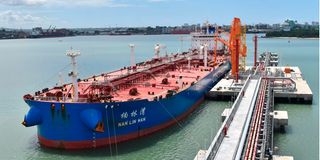Kenya’s fuel import bill dips 4pc as high cost put off consumers

Crude Oil Tanker 'Nan Lin Wan' discharges petroleum products at the KOT 2 in Mombasa on May 11, 2023.
Kenya’s fuel import bill dropped by 3.6 percent in the 12 months to May this year as high pump prices and slowed economic activity muted demand for the commodity.
Central Bank of Kenya (CBK) data shows that Kenya paid $5.344 billion (Sh750.83 billion) to import fuel products during the period, a drop from an expenditure of $5.548 billion (Sh779.49 billion) on the same in the same period in 2022.
Kenya’s economy has been struggling over the past 18 months as high inflation – driven by increased costs of fuel, electricity, food, and other commodities – and consumers have reacted by reducing consumption.
Data from the Energy and Petroleum Regulatory Authority (Epra) for instance shows consumption of petrol dropped to 1.50 million tonnes in 2022 down from 1.54 million tonnes in 2021.
The consumption of kerosene – used mainly by poor households for cooking and lighting – also fell significantly to 89,360 tonnes in 2022 down from 112,850 tonnes in the previous year.
Petrol is primarily used by light vehicles, and higher prices of the product often lead to many motorists parking their vehicles in favour of cheaper means of transport such as public transport.
Diesel has wider use in the economy and is used for transport, electricity generation, and machinery and equipment. This means its consumption is less affected by price pressures compared to petrol and kerosene.
For instance, while consumption of petrol and kerosene fell sharply in 2022, that of diesel fell by a lower margin to 2.26 million tonnes from 2.28 million metric tonnes in 2021.
The diminished consumption came after a sharp increase in fuel prices, with average retail prices for a litre of petrol rising to Sh177.3 in December up from prices of Sh129.72 per litre in January, according to data from the Kenya National Bureau of Statistics (KNBS).
Further, diesel prices rose sharply to Sh162 per litre from Sh129.72 during the same period, while those of kerosene increased to an average of Sh145.94 from Sh103.54 per litre.
In total, imports into the country declined by 2.3 percent in the 12 months to May 2023 from a growth of 20.4 percent in the same period to May 2022, a drop that the CBK attributed to lower imports of infrastructure-related equipment due to completed projects.
During the period, spending on imports other than oil products dropped to $13 billion (Sh1.827 trillion) down from $13.588 billion (Sh1.909 trillion).
The value of imported machinery and transport equipment also fell to $3.412 billion (Sh479.55 billion) down from $3.76 billion (Sh528.46 billion).
The CBK has tipped inflation – which stood at 8 percent in May – to remain high in the medium term as prices of commodities will remain elevated during the period.
“Overall inflation is expected to remain elevated in the near term, mainly due to the recent increase in electricity prices, the removal of the fuel subsidy and associated second-round effects,” said the CBK.





